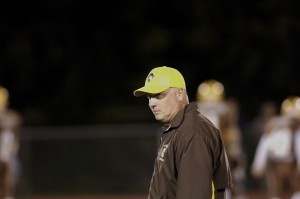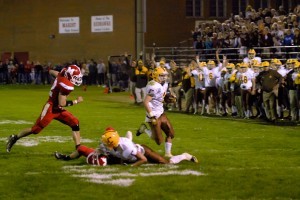Blog: Brown Beginnings, Issue 8 (The Art of Tension)
As the release of the non-fiction book The Boys in Brown approaches, author Jon J. Kerr takes readers inside the process. On Tuesdays, the series Brown Beginnings gives readers a behind-the-scenes look at the conception and reporting of the story. Thursdays, he blogs about the writing and publishing steps before launch.
At the heart of every good story is tension. In fiction, the best novelists (John Grisham, Tom Clancy) manufacture tension by putting their characters in circumstances where the outcome is uncertain. For a writer, this is easier as moments are as anxious as he or she wants them to be. In non-fiction, tension can’t be forced. It must unfold organically.
As the 201o season rolled on for the Carmel Corsairs, I was in a fortunate circumstance. Because the team starting winning–and kept winning well into October–tension grew from triumph. After each Friday night, the mantra was, ‘let’s do it again!’ The thrill of victory (or the agony felt from any potential defeat) became the elixir consuming the program, driving them each week to repeat each conquering feat.

Credit: Steve Lester
After the Corsairs week 4 win over Joliet Catholic, players, coaches and the community knew the team was good. A win over a rival, especially early in a season, can imbue a team with confidence. The stakes become higher, expectations elevated. This push-pull, the space between reward and urgency, is where tension lies. This is always the best type of tension, when the strain, the stress, is also the thrill. And there was plenty of it around the Carmel football program after week 4.
I first witnessed growing tensity early the following week. Carmel was scheduled to face Marist, another conference opponent. For this game, the Corsairs wouldn’t have the advantage of playing at home. And injuries had started to become an issue. Here is a book excerpt from the week of the Marist game:
Head Coach Andy Bitto gave the team the weekend off after beating Joliet Catholic. It’s a game that will be remembered for a long time, but by Wednesday, the look on Coach Bitto’s face says he’s already forgotten it. Or at least put the memory on ice.
Leaning back on his office chair, he’s back to staring at the small television monitor propped up on a table behind his desk. He’s watching game film for Friday night’s opponent, Marist, and it scares him.
This is a week Coach Bitto and the coaches have dreaded since they saw Joliet Catholic on the schedule. Marist is what football coaches call a “trap game.” This means your team is playing…
1.The following week after an emotional win over a rival team
2.On the road with a longer-than-usual bus ride
3.Immediately after an emotional win over not just a rival but your biggest rival
Mother Nature is contributing to the anxiety. Tuesday’s practice is called off early due to a lightning storm in the area, and the team hasn’t had a full workday since the Wednesday before the Joliet Catholic game. There are a lot of distractions.
“I don’t like the distractions,” Coach Bitto says, who also has a nagging cough. “It makes it difficult with a week like this. Maybe they’ll go out and play like gangbusters, but I’m nervous.”

Credit: Steve Lester
Before I walked into Coach Bitto’s office that day, I remember thinking how happy everyone must be after beating Joliet Catholic. But I soon realized basking in the afterglow of success is not a practice of successful programs. Wins only serve as re-ignition fuel, tools for culture validation. Are we doing things the right way? Are we practicing with the right execution and intensity? Friday night’s result provides affirmation, positive or negative. Prosperity is not static, but an elastic force. Those who stop and smell the roses, well, they eventually fall in their vanity-created bed of flowers. And tension, even in flourishing times, is heathy.
That day, Coach Bitto created tension, not by diminishing the Corsairs accomplishments, but through urgency. He and the coaches were hard on the boys all week. There would be no resting on the previous week’s feats. The narrative was instead about what’s next? How can we as a team get better? This is another excerpt from a speech he gave to the boys after practice two days before the Marist game:
At the end of practice, Coach Bitto gathers the team on the stadium field. He has toned down the rhetoric from earlier in the afternoon, but his message is no less stern in its intent. In 48 hours, the Corsairs will play a football game, and they had better be prepared.
“Think about school or at work or TV shows,” he says. “You don’t have to be at the right time or the right place to do it. Teachers will let you make up a test. Your boss may give you a break and let you come in late one day. With TiVO, you know if you miss it, you can watch the Bears game later. When you are playing football it isn’t that way. You have to be ready to play at 7:30 p.m. no matter what. I don’t care if the band is out there naked. I don’t care if the bus is in a traffic jam. I don’t care if you are sick on a Wednesday. You have to be ready to play. Does everybody got that?
“Wish nothing. I can’t caution you enough. Don’t take for granted we had big victories the first four weeks, especially against Joliet Catholic. That doesn’t mean squat now! All we have is one chance. There are no second chances in sports. None.”

Credit: Steve Lester
That Friday night, Carmel would defeat Marist 20-16 in the season’s most thrilling game. The Corsairs remained unbeaten. But what they learned through triumph was how greatness is achieved not through complacency, but through pressure. And how tension–healthy stress–can be a positive force within a program culture.



